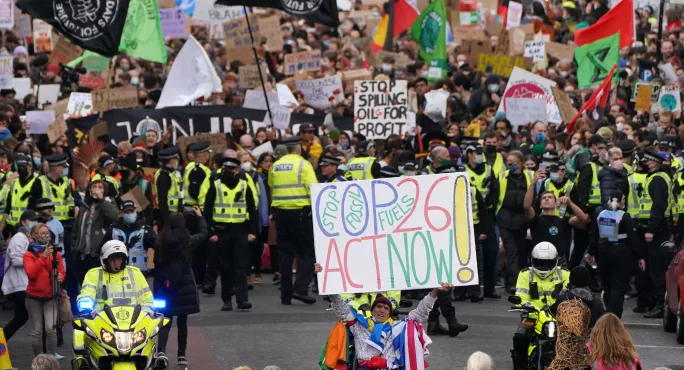Sustainability should be part of all that schools do

Schools and headteachers should approach everything they do with a “sustainability lens”, educators at a climate event have heard.
Delegates at the New York Times Climate Hub - run in parallel to the COP26 climate summit in Glasgow - were also told that schools are, crucially, listening to pupils’ views on climate change like never before.
At a session titled Headteachers’ tactics: How schools can prepare students for a changing climate, featuring three UK school leaders, there was consensus that education on climate change could no longer take place in “silos”.
WATCH: Pupils march for climate action at COP26
COP26: Studying geography has never been more important
Climate crisis and girls’ education: Better education of girls essential in response to the climate crisis, says Malala at COP26 event
COP26 summit: Teachers a ‘trusted source’ on climate change
Long read: The key role that schools can play in tackling the climate crisis after COP26
WATCH: Greta Thunberg addresses pupils at COP26 rally
Schools should approach everything they do with a “sustainability lens”, said Jane Lunnon, head of Alleyn’s School in London - not to do so would be a “massive disservice” to students.
Therese Andrews, director of curriculum innovation at Thomas’s Battersea Senior School, also in London, said that climate education should permeate throughout a school, not be left to geography and science lessons. She added that exams’ focus on discrete disciplines was not a good model for climate education.
After the event, some comments on social media pointed out that “learning for sustainability” has been an entitlement in Scotland for a number of years, but that this is not replicated throughout the UK.
The panellists at the event in Glasgow last week conceded that messages about climate change are so relentless that students can become fatigued about it. Robin Macpherson, head of Robert Gordon’s College in Aberdeen, cited research by Dr Daniel Olsson of Karlstad University in Sweden which showed that enthusiasm for climate issues can wane badly at ages 12 to 15, even among pupils who were enthused about them in primary school.
Ms Lunnon said that schools must show students how the small things people do can have a big impact cumulatively and that this would help reduce young people’s anxiety about climate change.
She advised that teachers find the thing for each student that will speak to them: the existential issue of climate change might not connect with a student, but a more focused drama or maths project could. She also said that there should be bespoke climate lessons for all students.
Mr Macpherson said that more critical thinking is required in climate education so that students feel more empowered to take action. As he put it: “Critical thinking is the Trojan horse for sustainability education.”
Ms Lunnon said pupils should be “involved as much as possible in the business elements of the school,” as they could be relied upon to keep a close eye on the sustainability of projects. Ms Andrews, similarly said that if students are given a chance to lead a project they will “really fly” with it.
Mr Macpherson described education as the “bedrock of everything” when it comes to meaningful climate action.
The session concluded on some upbeat notes. Mr Macpherson said it was “really exciting” to be working in schools at a time when students’ views on issues such as climate change are being listened to in a way that was not the case in the past. He was also encouraged that debate in schools had moved beyond whether climate change was happening to what should be done about it.
Ms Lunnon said that, as a result of the Covid pandemic, schools could now call upon better technology, which made it easier to share resources and ideas on climate in a “gamechanging” way.
She was also encouraged by the “energy, joy, fun and hope” among young people at COP26.
You need a Tes subscription to read this article
Subscribe now to read this article and get other subscriber-only content:
- Unlimited access to all Tes magazine content
- Exclusive subscriber-only stories
- Award-winning email newsletters
Already a subscriber? Log in
You need a subscription to read this article
Subscribe now to read this article and get other subscriber-only content, including:
- Unlimited access to all Tes magazine content
- Exclusive subscriber-only stories
- Award-winning email newsletters
topics in this article



